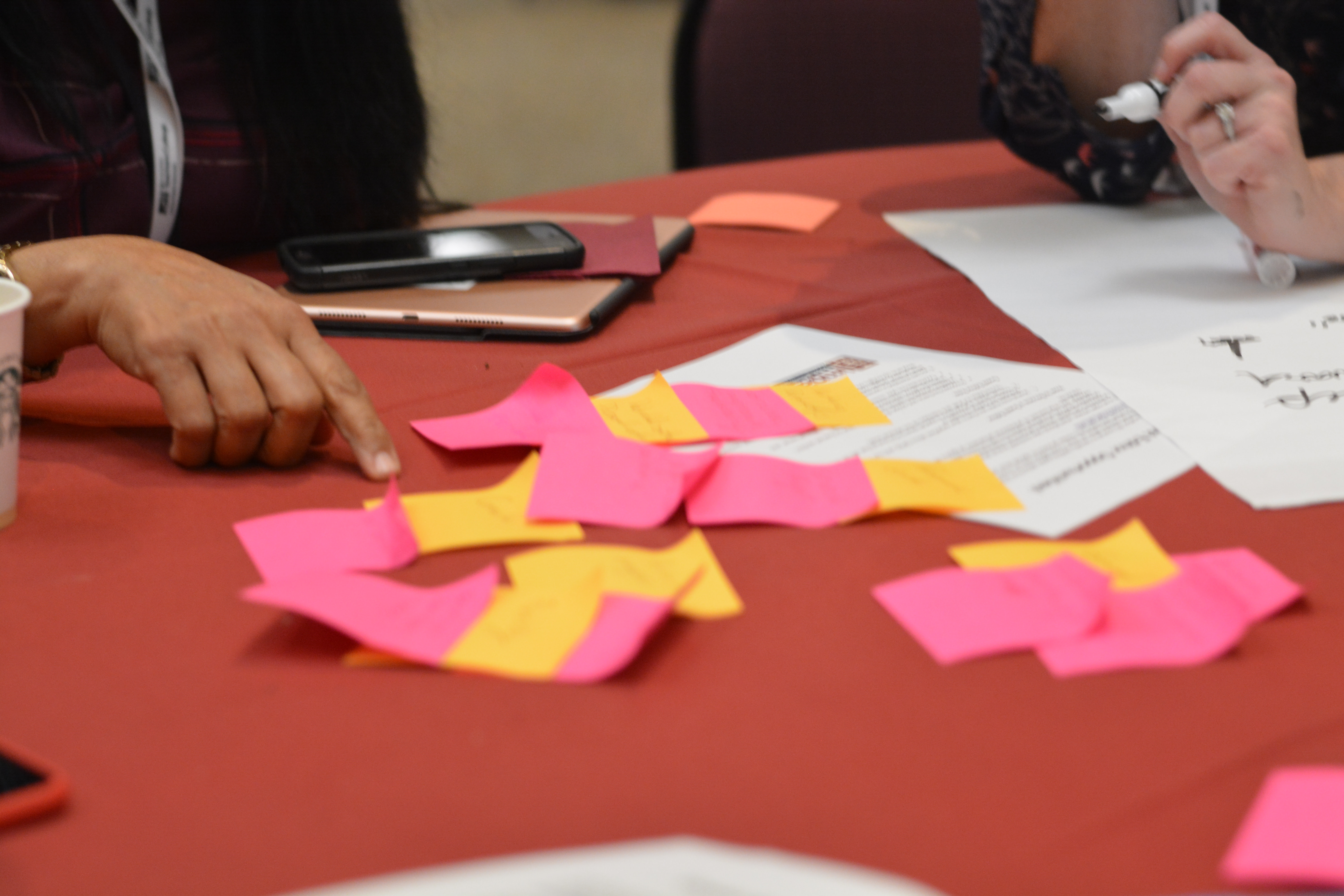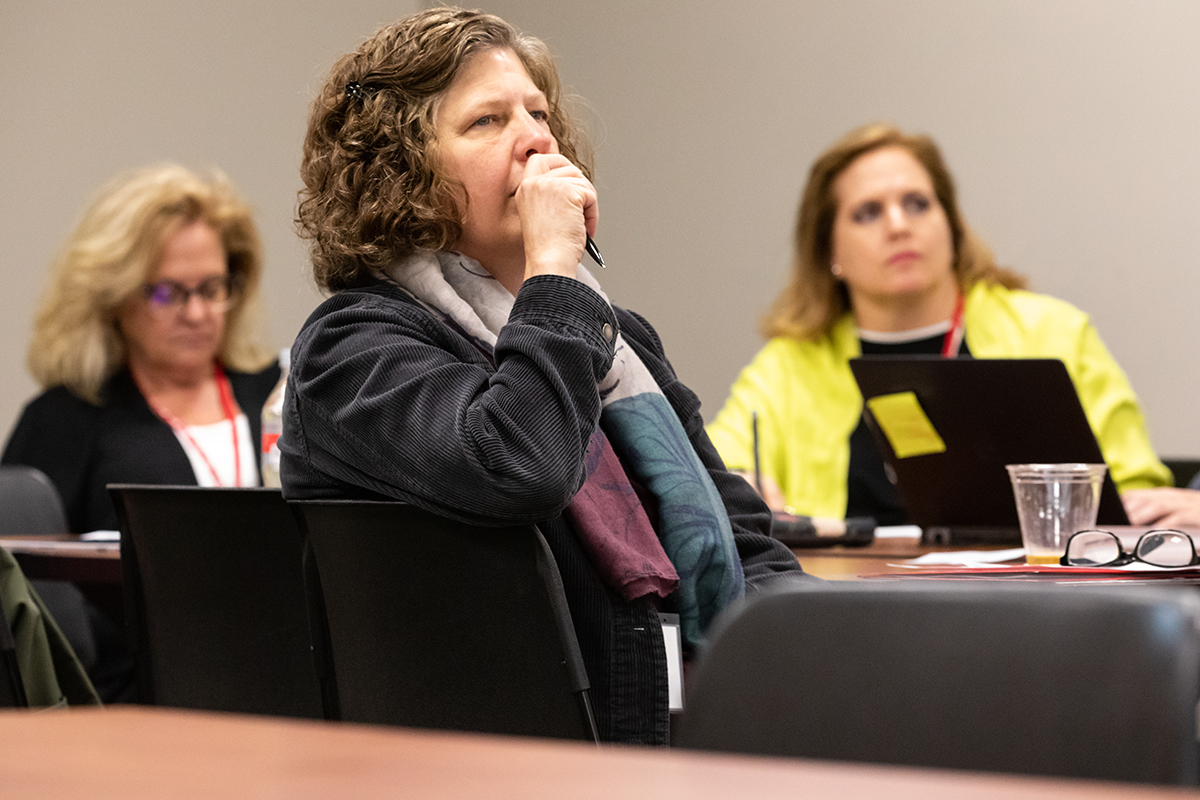
 In 2009 and 2010, through a collaborative, authentic process, members of CPED developed a framework for EdD program design/redesign that supports creating quality, rigorous practitioner preparation while honoring the local context of each member institution. In 2009 and 2010, through a collaborative, authentic process, members of CPED developed a framework for EdD program design/redesign that supports creating quality, rigorous practitioner preparation while honoring the local context of each member institution.
The CPED Framework© consists of three components—a new definition of the EdD, a set of guiding principles for program development and a set of design-concepts that serve as program building blocks. Download a graphic presentation of the Framework©
Members enter the Consortium at different points of considering a new EdD. As they engage in the Consortium, they utilize this Framework© to design/redesign, evaluate, and improve their programs. As such, CPED members are often at different phases in the design/redesign process. A description of the three phases can be found here.
Definition of the Education Doctorate
As a result of our work, the members of CPED believe:
“The professional doctorate in education prepares educators for the application of appropriate and specific practices, the generation of new knowledge, and for the stewardship of the profession.”
Recommended citation: Carnegie Project on the Education Doctorate. (2009). Definition of the Education Doctorate. CPED. https://cped.org
Guiding Principles for Program Design
 With this understanding, we have identified the following statements that will focus a research and development agenda to test, refine, and validate principles for the professional doctorate in education. The Professional Doctorate in education: With this understanding, we have identified the following statements that will focus a research and development agenda to test, refine, and validate principles for the professional doctorate in education. The Professional Doctorate in education:
- Is framed around questions of equity, ethics, and social justice to bring about solutions to complex problems of practice.
- Prepares leaders who can construct and apply knowledge to make a positive difference in the lives of individuals, families, organizations, and communities.
- Provides opportunities for candidates to develop and demonstrate collaboration and communication skills to work with diverse communities and to build partnerships.
- Provides field-based opportunities to analyze problems of practice and use multiple frames to develop meaningful solutions.
- Is grounded in and develops a professional knowledge base that integrates both practical and research knowledge, which links theory with systemic and systematic inquiry.
- Emphasizes the generation, transformation, and use of professional knowledge and practice.
Recommended citation: Carnegie Project on the Education Doctorate. (2009). Guiding principles for EdD program design. CPED. https://cped.org
Design-Concepts Upon Which to Build Programs
To build an EdD program upon these program principles, CPED members have defined a set of design concepts, which include:
Scholarly Practitioner: Scholarly Practitioners blend practical wisdom with professional skills and knowledge to name, frame, and solve problems of practice. They use practical research and applied theories as tools for change because they understand the importance of equity and social justice. They disseminate their work in multiple ways, and they have an obligation to resolve problems of practice by collaborating with key stakeholders, including the university, the educational institution, the community, and individuals.
Signature Pedagogy: Signature Pedagogy is the pervasive set of practices used to prepare scholarly practitioners for all aspects of their professional work: “to think, to perform, and to act with integrity” (Shulman, 2005, p.52). Signature pedagogy includes three dimensions as articulated by Lee Shulman (2005):
- Teaching is deliberate, pervasive, and persistent. It challenges assumptions, engages in action, and requires ongoing assessment and accountability.
- Teaching and learning are grounded in theory, research, and in problems of practice. It leads to habits of mind, hand, and heart that can and will be applied to authentic professional settings.
- Teaching helps students develop a critical and professional stance with a moral and ethical imperative for equity and social justice.
Inquiry as Practice: Inquiry as Practice is the process of posing significant questions that focus on complex problems of practice. By using various research, theories, and professional wisdom, scholarly practitioners design innovative solutions to address the problems of practice. At the center of Inquiry of Practice is the ability to use data to understand the effects of innovation. As such, Inquiry of Practice requires the ability to gather, organize, judge, aggregate, and analyze situations, literature, and data with a critical lens.
Laboratories of Practice: Laboratories of Practice are settings where theory and practice inform and enrich each other. They address complex problems of practice where ideas—formed by the intersection of theory, inquiry, and practice—can be implemented, measured, and analyzed for the impact made. Laboratories of Practice facilitate transformative and generative learning that is measured by the development of scholarly expertise and implementation of practice.
Dissertation in Practice: The Dissertation in Practice is a scholarly endeavor that impacts a complex problem of practice.
Problem of Practice: A Problem of Practice is as a persistent, contextualized, and specific issue embedded in the work of a professional practitioner, the addressing of which has the potential to result in improved understanding, experience, and outcomes.
Mentoring and Advising: Mentoring and Advising in EdD programs should be guided by:
- Equity and justice that fosters responsive mentoring regardless of age, ability, ethnicity, culture, race, religion, gender, or identity;
- Mutual respect that ensures students, advisers, and mentors are respected for their practical knowledge and understanding of research and inquiry; each capable of providing guidance and support to advance everyone's ability to apply mutually constructed knowledge across a variety of practical and theoretical contexts;
- Dynamic learning that provides open communication, critical friendships, and peer-to-peer support with reciprocal interactions and responsibilities that form a community of learners inclusive of adviser, mentor, and peer relationships;
- Flexibility that allows mentoring/advising to occur by all program faculty, in students’ work contexts, and in their available time;
- Intellectual space that supports students’ professional passions and needs by expanding their use of scholarship, inquiry, professional knowledge, and technology (when appropriate) to address problems;
- Supportive and safe learning environments that are developmental, directed, growth-oriented, team-oriented, and scaffolded so students are mentored/advised from the beginning of to the end of their programs while demonstrating an understanding of the needs of the adult learner;
- Cohort and Individualized attention that centralizes students’ needs and problems of practice in learning while valuing the practitioner student as unique;
- Rigorous practices that set high expectations through a shared sense of responsibility and accountability and offer challenges for students to conduct inquiry as practice aimed at improvement and the development of new knowledge;
- Integration that aligns with adult learner needs while reflecting a program’s values, norms, and the CPED Framework.
Recommended citation: Carnegie Project on the Education Doctorate. (2010). CPED Design Concepts. CPED. https://cped.org
|